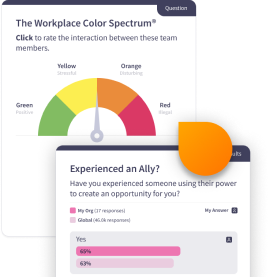
Custom Mission and Values Training
Course Video Preview
Example of how to follow business conduct standards involving a gift in exchange for business favors.Your Code of Conduct is more than a set of rules - it’s a statement and a concrete commitment to a set of business conduct standards that supports your mission, values, and culture.
But this online Workplace Ethics Code of Conduct training course program goes further. Even the best Code won’t create a healthy workplace culture on its own. It has to inspire and be supported by "culture" skills. We introduce your employees to four foundational skills they need to build a thriving work culture.
Course Description
This Workplace Ethics Code of Conduct training course program for employees also includes short, 4-minute summaries of key Code topics. You have the option to include the topics that make sense to your audience and industry and exclude the ones that don’t. Interactive polling questions in the Code of Conduct training program course give employers real insight into how employees feel about the concepts and culture skills presented. Emtrain’s innovative Ask the Expert feature gives learners direct access to course experts.
Emtrain's Code of Conduct training is available as a ready-to-launch, off-the-shelf solution. However, we also offer comprehensive customization options, including tailored messages from leadership, an extensive selection of lessons, custom reports, and much more.
Key Concepts
- How to build trust at work.
- How to make clear decisions.
- What accountability means.
- The importance of positive cultural norms.
Course Features
- Access to our Anonymous Ask the Expert tool
- Rich video scenarios based on real-world events
- Built-in employee sentiment surveys
- 50+ Machine Translation Options
- Optional program timer
- Policy acknowledgement tool
- Extensive customization options

Lessons
(40 min)
(60 min)
Our Code and Culture
Our Mission, Values, and Code of Conduct
How We Make Decisions
Norms, Trust and, Accountability
Mutual Respect
Talking Politics
Cyber Security
Data Privacy
Safeguarding Organizational Assets
Bribery, Corruption, and Government Officials
Social Media
Digital Communication
Insider Trading
Conflicts of Interest
Competition Law
Acknowledgement and Reporting
Provide Your Feedback
What is a Code of Conduct training Course? Why is it important?
Online Workplace Ethics Code of Conduct Courses for employees helps to understand what the organization's Mission, Values and Code of Conduct are - and the important role they play in defining 'who you are' as an organization.
Relevant Courses
Complementary Microlessons
Recommended Resources
From ‘Ask the Expert’
Emtrain’s Ask the Expert feature enables users to ask questions about compliance, bias, harassment, and diversity & inclusion as they come up. It’s all confidential, and answers are sent straight to their inbox. View some of the example questions below and see the Experts answers.

